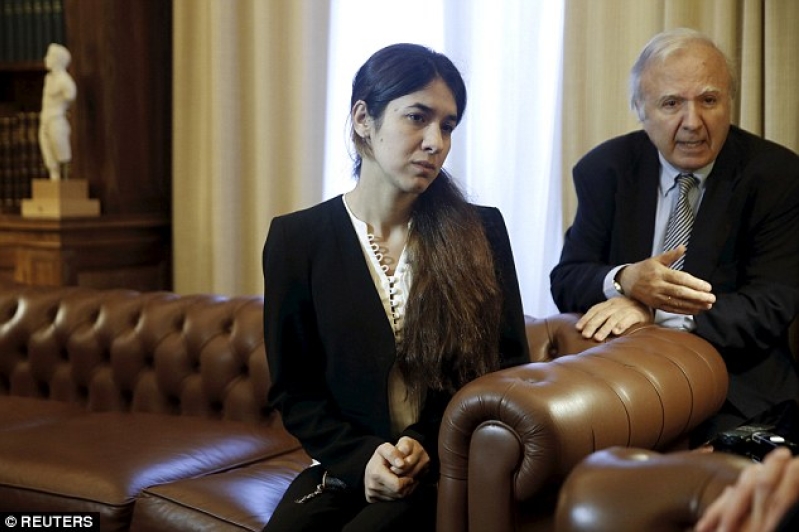
A 21-year-old Iraqi woman who was tortured and kept as a sex slave by the Islamic State terrorist group has escaped and opened up about the horrific acts the militants are inflicting on women and young girls.
According to a report from The Mirror, Nadia Murad shared her story during a visit to London, where she revealed that ISIS fighters killed six of her brothers and her mother in Sinjar, a town in Northern Iraq. Although her life was spared, Murad was taken as a sex slave along with 5,000 other Yazidi girls and women.
She explained that some of the women would have chosen to end their lives, however, as the extremist group forced them to endure things that were "more difficult than death."
"A year and a half has passed and the genocide against the Yazidis is continuous. We die every day because we see the world silent in the face of our plight," she recalled.
"My mother saw them killing my brothers and then they took my mother and killed her. I was already orphaned as I didn't have a father, all I had in the war was my mother," Murad continued.
"But when they took me to Mosul and raped me, I forgot my mother and brothers. Because what they were doing to the women was more difficult than death," she added."Imagine until now, for more than a year and a half, girls as young as 9 are being rented and sold out [for sex]."
In concluding her story, Murad revealed that the Yazidi community has lost trust in the government, as they can't return to Sinjar without protection. She branded ISIS "criminals" who needed to be tackled by the world community and asked for everyone to "come on board" in fighting the militant group.
As earlier reported by The Gospel Herald, over 100 of the Yazidi women who escaped ISIS after their mountain stronghold was attacked in August 2014 recently signed up to fight against the jihadist group. The women, known as the "Force of Sun Ladies," are officially fighting alongside Kurdish Peshmerga forces, while another 500, ranging in age from 17 to 37, are waiting to be trained.
"Now we are defending ourselves from the evil; we are defending all the minorities in the region," Capt. Khatoon Khider told Fox News. "We will do whatever is asked of us.
"We have a lot of our women in [nearby] Mosul being held as slaves. Their families are waiting for them. We are waiting for them. The liberation might help bring them home," she added.
The report detailed how, under ISIS captivity, many of the females were ordered to convert to Islam, subjected to forced marriages and repeatedly raped. Thousands of women starved to death or died of heatstroke, while a number of others deemed too old or young to be sold into sex slavery were killed off by the terrorist group.
In its English propaganda publication, "Dabiq," ISIS sought to justify its treatment of females, saying it is permissible under early Islamic law to capture and forcibly make "heretical" women sexual slaves.
"Before Shaytan [Satan] reveals his doubts to the weak-minded and weak hearted, one should remember that enslaving the families of the kuffar [infidels] and taking their women as concubines is a firmly established aspect of the Shari'ah that if one were to deny or mock, he would be denying or mocking the verses of the Qur'an and the narration of the Prophet ... and thereby apostatizing from Islam," the publication reads.
Meanwhile, the U.N. Assistance Mission for Iraq and U.N. human rights office released a report in January estimating that 3,500 people are "currently being held in slavery by ISIS numbers."
"Those being held are predominantly women and children and come primarily from the Yazidi community, but a number are also from other ethnic and religious minority communities," said the joint report issued in Geneva.






